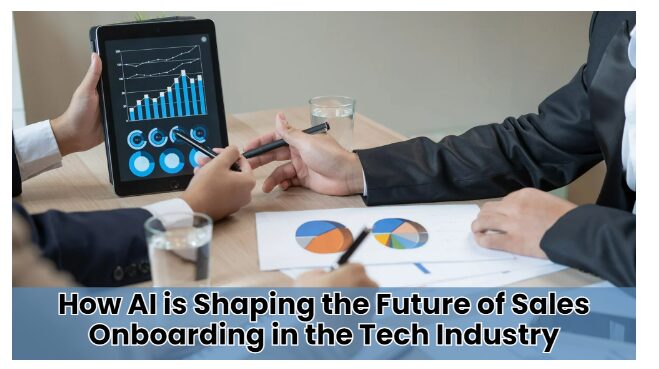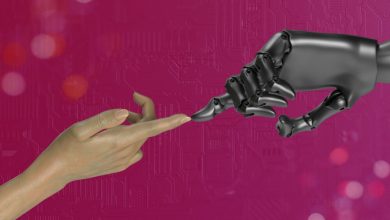How AI is Shaping the Future of Sales Onboarding in the Tech Industry

Are your sales teams being drowned with the vast amounts of information onboarding? Is your company experiencing high rates of employee turnover as the onboarding process is somehow just not engaging enough? Do you find yourself fighting to arm new hires with the right tools and knowledge to hit the ground running on their very first day?
These are all very common issues within the fast-paced world of tech sales. Fortunately, artificial intelligence has emerged and is transforming the sales onboarding process, addressing many of these issues. However, what exactly is AI doing to shape the future of the onboarding process in tech sales?
The Role of AI in Streamlining Onboarding
One major issue with traditional sales onboarding is the sheer volume of information. New hires often have to absorb extensive details on product specifications and sales techniques. However, such volume can facilitate slow improvement, errors, and frustration. AI has now streamlined this process by availing personalized data-driven learning experiences.
With AI, companies can create onboarding programs to be adaptive to every individual’s learning style as well as their pace. For example, through an AI-based platform, one can measure how quickly the recruit is learning things and then calibrate the content accordingly.
For example, if someone is picking up the features of the product pretty well but lacks in the acquisition of sales techniques, such an AI will be able to provide more resources in those areas. Such dynamic personalization will provide the right information at the right time to the sales team. It reduces frustration while ensuring the acceleration of productivity.
AI can automate routine onboarding tasks that typically cause delays, including scheduling training sessions and tracking employee progress. This approach provides valuable insights into how to improve the sales onboarding process, enabling both new hires and managers to dedicate more time to relationship building and hands-on training. The result is a more efficient and seamless onboarding experience for everyone involved.
AI-Based Chatbots and Virtual Assistants

AI is revolutionizing the onboarding process in yet another area, with the integration of chatbots and virtual assistants. Some of the questions employees ask when first joining an organization might be related to policies, tools, or sales procedures, which need to be clarified with a human mentor or manager.
This often leads to lengthy waiting times. With AI-based chatbots, new hires can immediately receive answers to frequently asked questions, while also gaining much-needed support during the onboarding process, 24 hours a day.
For example, a salesperson who has just joined the company may need a reminder of certain specific product characteristics or may want to know how to go about pitching the client. Rather than searching through manuals or waiting for an older colleague to respond, the AI chatbot can be approached for a speedier correct answer.
Beyond answering questions, AI-enabled virtual assistants can aid workflows by sending reminders, scheduling follow-up meetings, and even proposing next steps according to sales rep progress. With constant support, new hires don’t get overwhelmed and lose track but quickly improve the onboarding experience.
Enhancing Sales Training with AI-Driven Analytics

Sometimes, sales training is an onboarding critical component in the tech industry, though its effects aren’t quite effective. The teaching methods might also be general or not in touch with the actual challenges represented in the sales field. All that has changed with AI’s delivery of data-driven training experiences more relevant and impactful.
Real-time performance monitoring of sales teams is possible using analytics that are driven by AI. For example, one may track the way the new hires interact with training materials and which parts they fail to get right or how well they apply their knowledge in real life. All these pieces of data prove to be useful for the managers to spot gaps in knowledge with subsequent application of targeted coaching.
Another thing, with AI, is that it can understand the patterns of winning sales representatives and determine what is essential in making them successful. Recruits can be taught to emulate these behaviors of the winning reps and thus increase their chances of becoming high performers.
AI can also run simulations that replicate real-life scenarios to facilitate hands-on training without having to worry about losing a client. These simulations can be targeted towards specific sectors, products, or even client personas to create highly relevant training in preparation for new hires to take on the necessary tasks.
AI and Continuous Learning
After the initial sessions of sales onboarding, it does not get completed there. There must be continuous learning to keep abreast of this rapidly changing tech landscape. AI can assist in such continuous education by its delivery in bite-sized modules, just in time: keeping a sales rep up-to-date with the latest trends, product updates, and selling techniques.
For instance, AI-based platforms can take advantage of the sales reps’ performance within a recent period or recent market shifts to push relevant content. For instance, if there’s a new feature launch for a product, the system can automatically send learning modules to relevant team members so that they are aware without the need for a full-fledged retraining session.
AI can be used with predictive analytics to predict the need for learning in the future. Analyzing trend and performance data of companies as well as industries, AI predicts what will be needed and makes recommendations that far ahead can be used for training purposes. It keeps sales teams ahead of the curve, positioning them for success in the long run.
Reducing Turnover through Enhanced Engagement
| Problem | AI Solution | Benefit |
| Employee turnover due to poor onboarding | AI creates engaging and supportive onboarding processes. | Reduces turnover by making new hires feel connected and prepared. |
| Dry, outdated onboarding methods (manuals, lectures) | AI introduces interactive learning through simulations and gamification. | Creates a more engaging, real-world learning experience. |
| Lack of real-time tracking and intervention | AI tracks employee engagement in real-time and alerts managers/HR if an employee is disengaged. | Allows for timely intervention, improving retention and reducing turnover costs. |
Conclusion
Selling is an extremely dynamic industry, and what works as good training today won’t work tomorrow, making sound onboarding more important than at any other time in history. AI is revolutionizing the process of giving personalized learning experiences by streamlining complex, tedious tasks and leveraging data insights to improve training outcomes.
Firms can use chatbots, virtual assistants, and predictive analytics to create an efficient, engaging, and supportive onboarding experience. Bottom Line: AI is really the future of sales onboarding, but it’s also making companies capable of building better, more successful sales teams.
FAQs
- How does AI improve sales onboarding in the tech industry?
AI personalized learning automates repetitive tasks and provides real-time support to streamline the onboarding process.
- What role do AI chatbots play in sales onboarding?
AI chatbots offer 24/7 assistance, answering questions and guiding new hires instantly, helping them navigate onboarding more efficiently.
- Can AI adapt onboarding to individual learning styles?
Yes, AI customizes content to match each person’s pace and learning preferences, ensuring a tailored onboarding experience.
Read More From Techbullion





